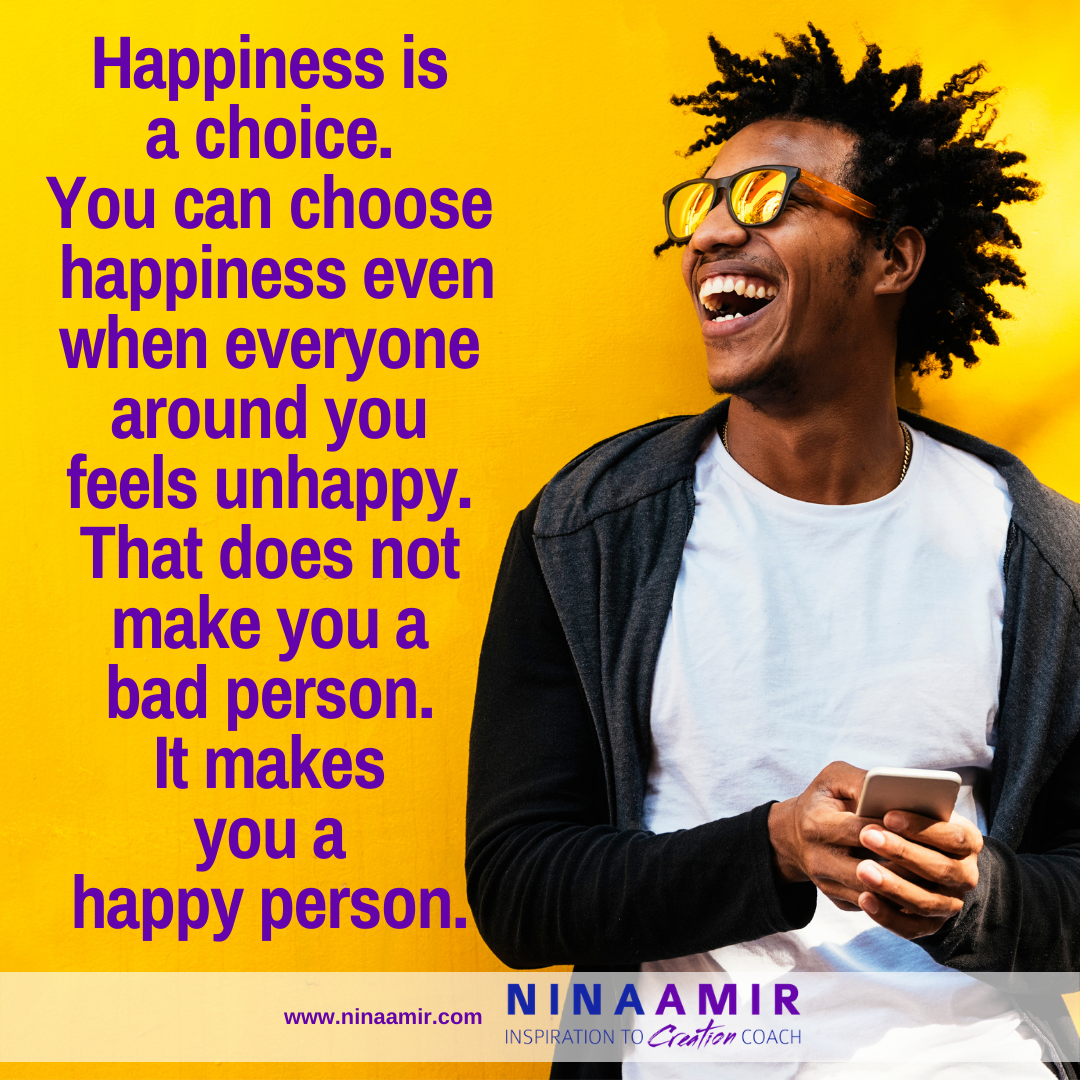 When someone is unhappy, it’s a human tendency to align your emotional state with theirs. And when a situation is challenging or upsetting, you’re taught to sync your emotions with those suffering. If you feel happy instead, you’ll likely be judged as unfeeling, self-centered, or lacking in compassion.
When someone is unhappy, it’s a human tendency to align your emotional state with theirs. And when a situation is challenging or upsetting, you’re taught to sync your emotions with those suffering. If you feel happy instead, you’ll likely be judged as unfeeling, self-centered, or lacking in compassion.
However, you don’t have to be unhappy, upset, or stressed because someone else feels that way. Nor do you have to have negative emotions just because you or someone else finds themselves in a challenging or dire situation.
You have a choice about how to feel.
Choosing to feel happy does not make you a bad person. Nor does it mean you are uncaring, selfish, or self-absorbed. It just makes you a happy person.
Exercise Your Ability to Choose
If you don’t exercise your ability to choose your emotions, you allow your internal state to be dictated by external circumstances, people, or situations. But if you exercise your power to choose, you get to decide how to feel at any given moment.
And choosing to feel happy is a good choice—for you and for others.
As I write this post, the COVID-19 pandemic is spreading like wildfire. The news reports that someone dies of the coronavirus every minute or less in the United States. It’s easy to focus on these facts and feel anxious, sad, and angry. Given the circumstances, it can seem callous to smile or spout hopeful or optimistic words—especially to those who might have lost a loved one, a job, or their life’s work.
But you don’t help yourself or anyone else by being miserable. Nor do you need to be unhappy despite any programming you’ve received that says you must be unhappy in specific situations. No rule says you must commiserate.
Why are you happy?
A woman I know was hospitalized recently. She was miserable about being there. I called to see how she was doing. I approached the conversation with an upbeat attitude and tone of voice while still understanding her plight and wanting to help.
She asked me, “What are you so happy about?”
In her mind, if she was miserable, I should be miserable, too. I should empathize with her, not just feel sympathy and compassion.
Sympathy vs. Compassion vs. Empathy
It is possible to be sympathetic and compassionate and not empathetic. And you can choose between these characteristics.
Empathy refers to feeling what another person is feeling. On the other hand, sympathy means understanding what the other person is feeling even without feeling it yourself. Compassion means you want to take action to relieve the suffering of another person.
I know many empaths—myself included. It’s difficult to feel what others feel all the time, especially when there is a lot of suffering in the world. Most of these people work hard to shut out all the emotions they feel from others. That doesn’t mean they don’t care, though.
You can understand what someone is feeling—even relate to it from past experience—and want to relieve their suffering but remain happy.
Impact the Collective Unconscious
Emotions have a frequency. Thus, if many people feel unhappy or afraid, their emotions impact the emotional state of those around them. Ultimately, those emotions affect all of us who live on Planet Earth.
A pandemic, natural disaster, war, terrorist attack, or massive accident can send waves of negative emotion around the world. If you choose to feel anger, sadness, horror, fear, or mistrust, you add to that wave’s size and intensity.
By choosing to be happy, however, you help lessen the effect of all those negative emotions. If you need a reason to be happy, that’s a good one. Of course, you can choose happiness as a way to impact those close to you and yourself, too.
How to Feel Happy No Matter What
So how can you be happy—especially during a pandemic, after the death of a loved one, or when life throughs a wrench in your best-laid plans and efforts? Here are five ways.
1. Choose happiness
Yes, happiness is a choice. When you feel sad, angry, or afraid, consciously choose to feel happy.
2. Focus on things that make you happy.
How do you feel happy when you actually feel sad, angry, or afraid? Pay close attention to where you focus your thoughts.
Your thoughts create your emotions. If you are experiencing negative emotions, you thought are on something that produces that feeling. Instead, intentionally think about something that makes you happy.
3. Be Sympathetic (not Empathetic)
Instead of trying to feel what another person feels, attempt to understand what they feel. Ask them questions about what they are experiencing. Get to the point where you can feel sympathy—even compassion—but don’t put yourself in their shoes.
4. Be Compassionate
With understanding comes a desire to be of service—to put people out of their misery. So, go ahead and help in the best way you can. Make them feel better. As a result, you will feel better, too.
Feel happy. Then you can help others feel happy.
Caution! Don’t focus on the outcome; some people like to stay unhappy. Just feel good about your efforts.
5. Do What Makes You Feel Good
Take a break from the news, caregiving, trying to find a job, grief, or whatever brings you down. Go do something that makes you feel good.
Have some fun… Yes, it’s allowed—and healthy—even amidst a tragedy.
Many mystical traditions advise that we do whatever it takes to feel happy—even joyous. The state of happiness increases our ability to connect with our higher selves or Creator. In other words, being happy is a high spiritual state.
You are a Good Person
Too many of us have been taught that we aren’t good people if we don’t have empathy. But that isn’t true. It’s not helpful or healthy to feel empathy for everyone all the time.
We are told that if we are happy when others are not, there is a flaw in our character. We must be selfish, uncaring, or uncompassionate.
Don’t believe this. It’s not true.
You can be happy in some really difficult situations and still be a good person. Really…
Interesting Evolutionary Experience
My spiritual teacher, Stuart Wilde, used to look at things that happened—like the Holocaust, 9–11, pandemics, and airplane crashes—and say, “What an interesting evolutionary experience.”
He didn’t see disasters as…well…disasters. He saw them as human experiences that caused those involved to evolve in a variety of ways. Specifically, he saw spiritual beings in human bodies making choices about how they experienced life or, in some cases, left the physical plane.
This perspective requires that you believe that humans are spiritual beings having a physical experience. And you must believe that, before we even enter the physical body, we choose what we will experience and learn during our incarnation on Earth.
Even if that is not your belief, looking at other people’s experiences with a bit of intentional distance can help you be more objective. From that place, you can intentionally choose how to respond to any situation rather than react.
Too often, our reaction when “bad things happen” is to become unhappy or experience some type of negative emotion. With a bit of distance and perspective, though, you can choose to respond—and respond with happiness or, at the least, a positive emotion like hope, peace, or love.
A bit of objectivity coupled with intentionality allows you to choose your emotional state—to be happy despite anything going on in your life or around you. It helps you not get caught up in the wave of negative emotion.
Even when we don’t have a year like 2020, we could all use a little more happiness in our lives. So, be happy…and spread your joy to others.
How do you make yourself happy? Tell me in a comment below. And please share this post with your social network or someone you feel will benefit.
Never miss one of my videos! Click here to subscribe to my YouTube channel.
 Would you like to learn how to get inspired and stay motivated? Give me 90 minutes of your time, and I’ll help you discover the inspired next steps that will help you achieve the personal and spiritual growth you desire. Apply for a FREE Certified High Performance Coaching breakthrough strategy session. Fill out this application.
Would you like to learn how to get inspired and stay motivated? Give me 90 minutes of your time, and I’ll help you discover the inspired next steps that will help you achieve the personal and spiritual growth you desire. Apply for a FREE Certified High Performance Coaching breakthrough strategy session. Fill out this application.
Or, if you prefer a spiritual and personal growth program (and group coaching), click here to become a Founding Member of the Inspired Creator Community. Get the same world-class Certified High Performance Coaching program, and learn to live a life that feeds your soul.
Photo courtesy of StockSnap .


i love this blog! im actually using some quotes for an essay I’m doing for school 🙂